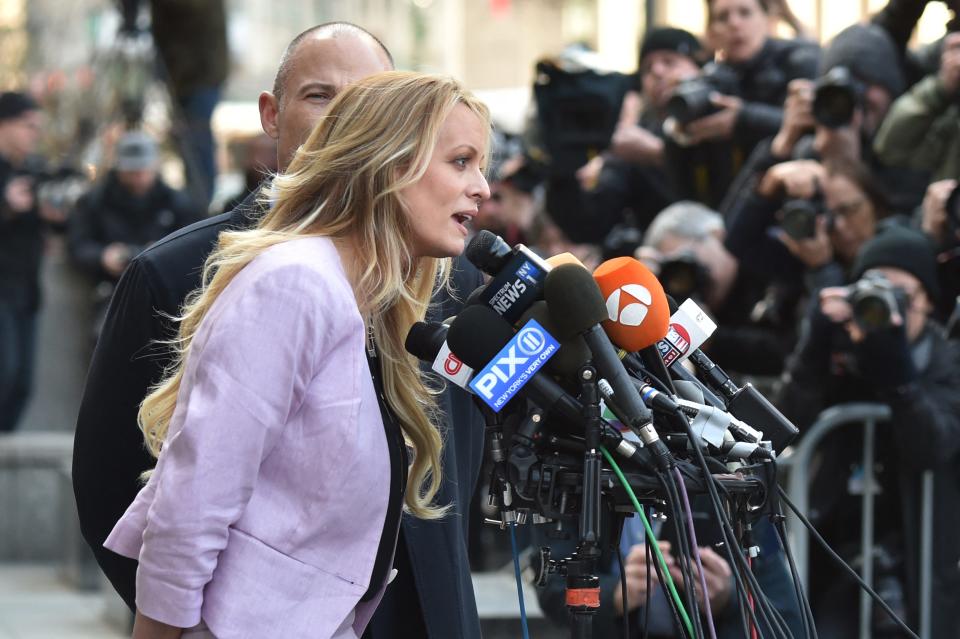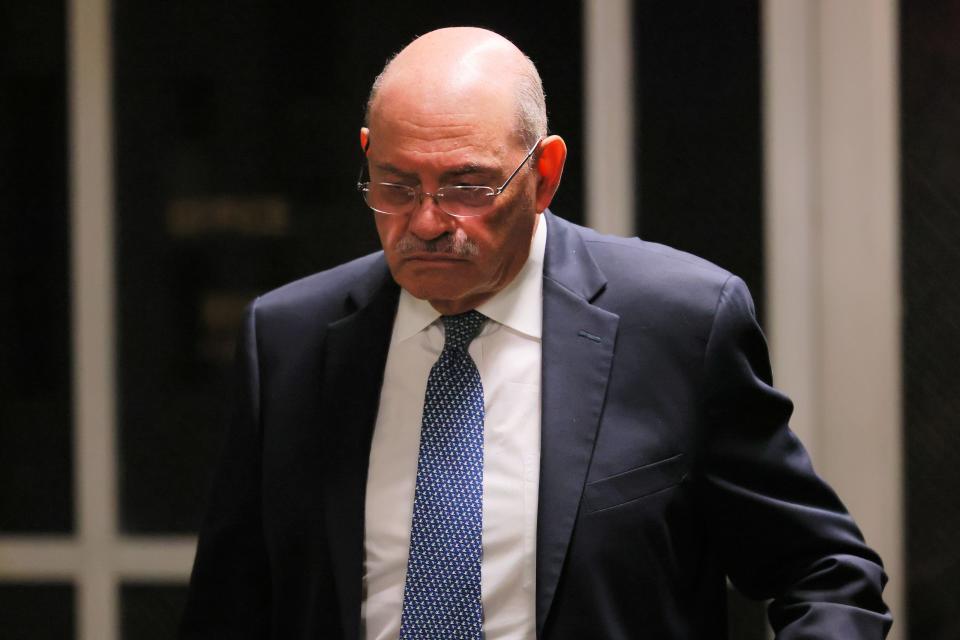Donald Trump's bombastic legal strategy failed, he lost his strongest case: trial takeaways
Donald Trump's conviction of falsifying business records sent a seismic shock to the 2024 presidential campaign.
The six-week trial featured 22 witnesses who outlined how Trump reimbursed his former personal lawyer, Michael Cohen, for paying $130,000 before the 2016 election to mute porn actress Stormy Daniels’ claim of extramarital sex with Trump.
The trial painted a portrait of a tycoon who kept a close eye on his real estate empire from the White House and whose employees mostly professed strong loyalty to him, even from behind bars − except the embittered Cohen, who became a key witness against him.
The first criminal conviction of a former president raised the possibility that Trump will be sentenced to jail time, but he is unlikely to be locked up before the election as he is expected to appeal.
Here is a rundown of that and other key takeaways from the trial:
Trump's bombastic legal strategy failed
Trump’s legal strategy of loudly and repeatedly disputing evidence in the hallway outside the courtroom rather than through witnesses failed.
Trump repeatedly assailed Merchan and Manhattan District Attorney Alvin Bragg in hallway speeches and on social media as “corrupt” Democrats bent on persecuting him politically.
The gag order halted his comments about witnesses such as Cohen, who he earlier called a liar, and Daniels, who he earlier called horseface.
(In the courtroom, Trump mostly kept his mouth shut, although Merchan scolded him for saying something to a potential juror and for muttering during the testimony of porn actress Stormy Daniels.)
Defense lawyer Todd Blanche called Cohen the “embodiment of reasonable doubt” and said Daniels demanding payment was part of “an extortion.”
But other than tearing down prosecution witnesses, Trump's lawyers called only two witnesses including Robert Costello, who served as a legal adviser to Cohen. Merchan scolded Costello for "contemptuous" reaction to his rulings. Trump initially said he would testify but ultimately did not.

Stormy Daniels and Michael Cohen hate Trump, but others remain loyal to him
Daniels provided vivid testimony about the alleged sexual encounter with Trump that illustrated why he would want to silence her weeks before a presidential election. But Trump's team demanded Merchan dismiss the case because the story was more salacious than substantive for the bookkeeping charges.
When Trump's lawyer Todd Blanche asked Cohen if he wanted to see Trump locked up, Cohen replied, "I would like to see accountability. It's not for me – it's for the jury and this court."
Daniels mentioned details such as the reality TV star's silky pajamas and the gold tweezers she saw in his hotel suite bathroom, and him not wearing a condom during the sex. She said she blacked out during the sex, but didn't accuse him of forcing her.
But Trump lawyer Todd Blanche argued Daniels said things that were only meant to embarrass Trump and "to inflame this jury." Blanche called part of her testimony a "dog whistle for rape."
Other witnesses, such as former presidential aide Madeleine Westerhout, called Trump "a really good boss" and "really enjoyable to work for." Former campaign spokesperson Hope Hicks seemed pained by having to testify for the prosecution and broke down in tears.
The prosecution brought receipts
While the defense tried to portray the case as hinging on the testimony of Cohen, a convicted perjurer, the prosecution bolstered his testimony with other forms of evidence, including a recording of Trump and Cohen discussing the payment to McDougal and Trump's signature on the checks reimbursing Cohen for the payment to Daniels.
David Pecker, former CEO and president of American Media Inc., which included the National Enquirer, agreed in an August 2015 with Trump and Cohen to be the "eyes and ears" of the campaign to keep negative stories about the candidate out of the press. Pecker paid a former Playboy model, Karen McDougal, $150,000 to silence her claim about an affair with Trump.
Emails showed how a National Enquirer editor, Dylan Howard, and Keith Davidson, the lawyer representing Daniels, negotiated the nondisclosure agreement with Cohen. Other witnesses bolstered Cohen's testimony, such as Pecker describing his meeting with Trump and Cohen in Trump Tower to discuss how to derail negative stories.
"Documents don't lie," prosecutor Joshua Steinglass said.
Trump's sentence could entail probation or jail time
The maximum penalty for felony falsifying business records is four years. Trump had argued prosecutors sought to put him in prison for up to a 136 years for the 34 counts, although state law limited the maximum sentence to 20 years.
"They think they can LOCK ME UP FOR LIFE when their RIGGED trials start TOMORROW," the 77-year-old Trump said in a fundraising email when the trial started in April.
But legal experts said first-time offenders are often typically sentences of probation or perhaps a short term of incarceration for nonviolent offenses.
Allen Weisselberg, the Trump Organization’s former chief financial officer, has served two several-month stints on Rikers Island for not reporting benefits from his job and for perjury in an earlier Trump trial.

But Trump will be free while he appeals
Trump has complained repeatedly Judge Juan Merchan's decisions in the case, including refusing to dismiss the charges, and placing a gag order against commenting on witnesses or jurors
So far, appeals judges have upheld Merchan’s gag order and a decision not to move the trial. But Trump's appeals of the verdict could take months or years winding through the First Judicial Department, which hears initial appeals from the trial court, and then the Court of Appeals, the highest state court.
Trump is likely to remain free while he appeals, although Merchan or the appeals court would have to make that decision.
Potential reasons for appeal include Trump arguing the deadline to file the underlying charges of falsifying business records has expired and that Daniels' testimony about the sexual episode was irrelevant to the charges.
Judge worried during trial about logistics of jailing a former president
Locking up a former president could be challenging because he is protected by Secret Service agents. The agency and state court officials have said they will be able to accommodate whatever happens.
Merchan threatened Trump with jail on May 6 if he continued to violate a gag order barring him from by commenting on witnesses after being fined $10,000 for 10 violations.
“Mr. Trump, it’s important to understand that the last thing I want to do is to put you in jail,” Merchan said. “You are the former president of the United States and possibly the next president, as well.”
Merchan said he also worried about how court officers, correction officers and Secret Service agents would be able to execute the order.
Trump has three other criminal cases pending, but they may never happen
Bragg secured the first indictment against Trump and concluded what might be the only criminal trial before the Nov. 5 election, despite having what some legal experts thought was the weakest case.
Trump faces three more criminal trials: federal charges of election interference in Washington, federal charges of hoarding classified documents in Florida and Georgia charges of election racketeering.
But if he wins the election, Trump could potentially tell the Justice Department to abandon the two federal cases. His lawyers have argued he couldn't be prosecuted on the Georgia charges while in office.
Justice Department special counsel Jack Smith's trial on election interference charges is on hold waiting for the Supreme Court to decide whether Trump is immune from criminal charges as a former president. The ruling could take another month and, if the case proceeds, pretrial preparations could take at least another two months. But the trial is the likeliest of those remaining to occur before the Nov. 5 election.
Preparing for the Florida trial about documents at Mar-a-Lago, prosecutors and defense lawyers are wrangling over issues such as what evidence will be allowed. The issues are thorny because they involve classified records the government hopes to keep secret.
The Georgia trial is unscheduled while Trump appeals the decision allowing Fulton County District Attorney Fani Willis to remain on the case. Willis suggested an August start to the five month trial, but that would keep Trump off the campaign trail for the final three months of the presidential campaign and overlap with the election.
This article originally appeared on USA TODAY: Donald Trump becomes first ex-president felon; takeaways


